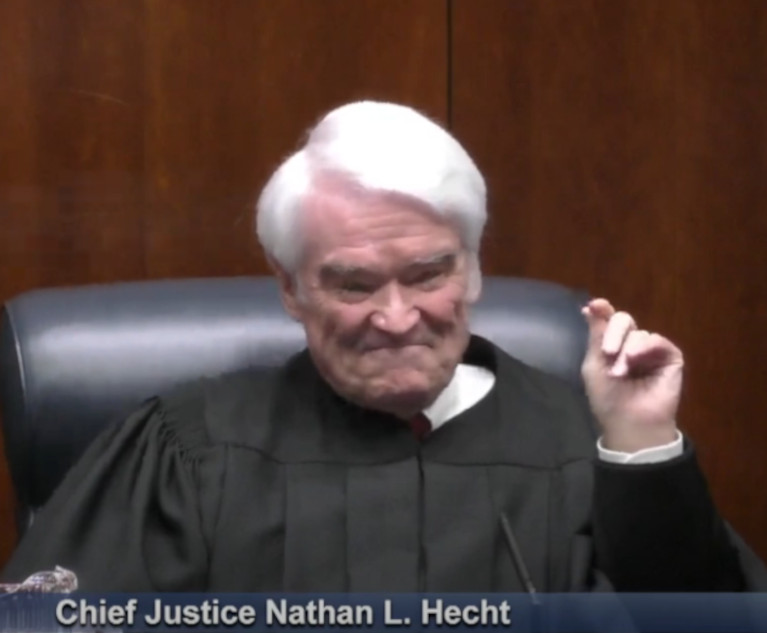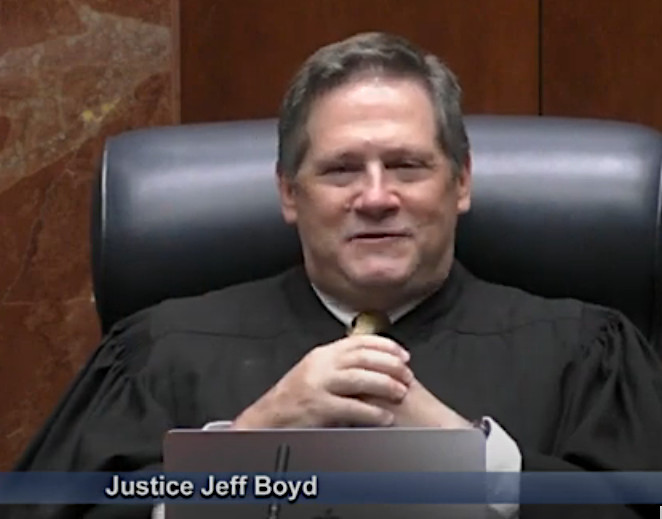Photos: Meet Group Working to Remove Politics From Texas Judicial Elections
Bills to change how Texas elects its judges failed to pass the legislature eight times since 1993, but supporters are optimistic.
October 30, 2019 at 02:32 PM
3 minute read
A star-studded group of litigators will lead the Lone Star State's latest study to eliminate partisanship from judicial elections. But if the effort tracks history, Texas judges will still have an "R" or "D" next to their name on the ballot. This week, the state's top politicians named a 15-person Texas Commission on Judicial Selection, which will be studying alternative methods of judicial selection, and preparing a report for the Texas Legislature by the end of 2020. Based on the study, lawmakers would have to pass a proposed constitutional amendment, the governor would have to sign it, and voters would have to approve it to make the change effective. Bills to change how Texas elects its judges failed to pass the legislature eight times since 1993, and nothing came of a 2014 study to consider the issue again. Optimistically, supporters say there's a chance it will turn out different this time.
Read about the 2014 study:
Should Texas Reform Partisan Elections for Judges?
"In the past, we've never really had a governor who's willing to support anything along this line," said Beck Redden partner David Beck of Houston, named commission chairman by Texas Gov. Greg Abbott on Oct. 28. "Here, is a situation, we have a governor willing to say, 'Look, we've got a serious problem.'" Abbott took to Twitter to express his support for reform early this year, writing, "Texas must evaluate the importance of an independent judiciary free from politics. We need judges devoted to the constitution and strict application of the law, not to the political winds of the day." The governor's support could make a difference, said Texas Supreme Court Chief Justice Nathan Hecht. "Gov. Abbott is the first governor in Texas history to support changes to judicial selection publicly," he noted. Voters may misunderstand what it means to take partisanship out of judiciary races, thinking it eliminates their ability to vote, Hecht said. But other methods of judicial selection still let them cast a ballot, just without party affiliation, he explained. "Sometimes people are told that this is trying to move judges away from accountability, but that's not the intent of it," he said. "To be elected on a partisan ballot, you've got to campaign; you've got to raise money. I've never known a judge who thought it was a good idea to go out and raise money." The harm of partisan sweeps that eliminate qualified jurists was one reason that the Texans for Lawsuit Reform Foundation came out against partisan judge elections in a recent paper, "Evaluating Judicial Selection In Texas: A Comparative Study of State Judicial Selection Methods." Texans for Lawsuit Reform is a powerful tort reform lobbying group, and the bills it supports often end up passing the Texas Legislature. "For many years we have recognized that partisan election of judges is disruptive to the legal system, disheartening to judges and disconcerting to citizens," said TLR spokeswoman Lucy Nashed in an email. "TLR will actively support the Judicial Selection Commission's work to determine if there is a better way to select our judges." |
Read about the alternative judicial selection methods the commission will study:
This content has been archived. It is available through our partners, LexisNexis® and Bloomberg Law.
To view this content, please continue to their sites.
Not a Lexis Subscriber?
Subscribe Now
Not a Bloomberg Law Subscriber?
Subscribe Now
NOT FOR REPRINT
© 2025 ALM Global, LLC, All Rights Reserved. Request academic re-use from www.copyright.com. All other uses, submit a request to [email protected]. For more information visit Asset & Logo Licensing.
You Might Like
View All


Paxton Boasts as Texas Supreme Court Splits on Disciplining First Assistant Attorney General
4 minute read
Trending Stories
- 1Restoring Trust in the Courts Starts in New York
- 2'Pull Back the Curtain': Ex-NFL Players Seek Discovery in Lawsuit Over League's Disability Plan
- 3Tensions Run High at Final Hearing Before Manhattan Congestion Pricing Takes Effect
- 4Improper Removal to Fed. Court Leads to $100K Bill for Blue Cross Blue Shield
- 5Michael Halpern, Beloved Key West Attorney, Dies at 72
Who Got The Work
Michael G. Bongiorno, Andrew Scott Dulberg and Elizabeth E. Driscoll from Wilmer Cutler Pickering Hale and Dorr have stepped in to represent Symbotic Inc., an A.I.-enabled technology platform that focuses on increasing supply chain efficiency, and other defendants in a pending shareholder derivative lawsuit. The case, filed Oct. 2 in Massachusetts District Court by the Brown Law Firm on behalf of Stephen Austen, accuses certain officers and directors of misleading investors in regard to Symbotic's potential for margin growth by failing to disclose that the company was not equipped to timely deploy its systems or manage expenses through project delays. The case, assigned to U.S. District Judge Nathaniel M. Gorton, is 1:24-cv-12522, Austen v. Cohen et al.
Who Got The Work
Edmund Polubinski and Marie Killmond of Davis Polk & Wardwell have entered appearances for data platform software development company MongoDB and other defendants in a pending shareholder derivative lawsuit. The action, filed Oct. 7 in New York Southern District Court by the Brown Law Firm, accuses the company's directors and/or officers of falsely expressing confidence in the company’s restructuring of its sales incentive plan and downplaying the severity of decreases in its upfront commitments. The case is 1:24-cv-07594, Roy v. Ittycheria et al.
Who Got The Work
Amy O. Bruchs and Kurt F. Ellison of Michael Best & Friedrich have entered appearances for Epic Systems Corp. in a pending employment discrimination lawsuit. The suit was filed Sept. 7 in Wisconsin Western District Court by Levine Eisberner LLC and Siri & Glimstad on behalf of a project manager who claims that he was wrongfully terminated after applying for a religious exemption to the defendant's COVID-19 vaccine mandate. The case, assigned to U.S. Magistrate Judge Anita Marie Boor, is 3:24-cv-00630, Secker, Nathan v. Epic Systems Corporation.
Who Got The Work
David X. Sullivan, Thomas J. Finn and Gregory A. Hall from McCarter & English have entered appearances for Sunrun Installation Services in a pending civil rights lawsuit. The complaint was filed Sept. 4 in Connecticut District Court by attorney Robert M. Berke on behalf of former employee George Edward Steins, who was arrested and charged with employing an unregistered home improvement salesperson. The complaint alleges that had Sunrun informed the Connecticut Department of Consumer Protection that the plaintiff's employment had ended in 2017 and that he no longer held Sunrun's home improvement contractor license, he would not have been hit with charges, which were dismissed in May 2024. The case, assigned to U.S. District Judge Jeffrey A. Meyer, is 3:24-cv-01423, Steins v. Sunrun, Inc. et al.
Who Got The Work
Greenberg Traurig shareholder Joshua L. Raskin has entered an appearance for boohoo.com UK Ltd. in a pending patent infringement lawsuit. The suit, filed Sept. 3 in Texas Eastern District Court by Rozier Hardt McDonough on behalf of Alto Dynamics, asserts five patents related to an online shopping platform. The case, assigned to U.S. District Judge Rodney Gilstrap, is 2:24-cv-00719, Alto Dynamics, LLC v. boohoo.com UK Limited.
Featured Firms
Law Offices of Gary Martin Hays & Associates, P.C.
(470) 294-1674
Law Offices of Mark E. Salomone
(857) 444-6468
Smith & Hassler
(713) 739-1250






